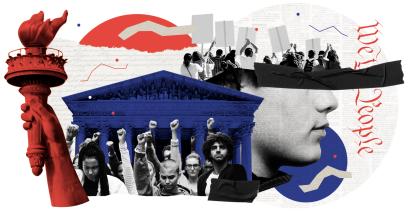History is full of ideas that were at some point considered heretical or deviant. The struggles for religious liberty, women’s rights, reproductive freedom, civil rights, LGBTQIA+ rights, and many other forms of progress were thwarted by restrictions on voicing what were once seen as dangerous ideas. For decades, laws prevented the dissemination of information about birth control; in 1929, reproductive freedom pioneer Margaret Sanger was arrested after giving a speech advocating women’s rights. Not until 1977 did the Supreme Court extend full legal protection to the ideas Sanger was advancing, ruling that the First Amendment prohibited bans on advertising for contraception. Free speech protections have been essential to ensuring that champions of once-revolutionary ideas could make their case.
When you bring up “free speech” to Americans, there’s a good chance that, in their response, they’ll use the words “First Amendment.” It’s almost a reflex. Yet many free speech conflicts lie outside the purview of constitutional law. The First Amendment reads, “Congress shall make no law respecting an establishment of religion, or prohibiting the free exercise thereof; or abridging the freedom of speech, or of the press; or the right of the people peaceably to assemble, and to petition the Government for a redress of grievances.” Courts have held that it applies not just to “Congress” but also to the executive branch and—through a doctrine known as “incorporation”—state and local governments and institutions.
The First Amendment is framed to ensure a “negative right,” the right to be free from government interference. But free speech also entails an affirmative right to speak out, a liberty that cannot be fully guaranteed in law and must be enabled by society through education and opportunity. When we consider why we value free speech—its truth-finding, democratic, and creative functions—it also becomes clear that the freedom to speak, narrowly construed, isn’t enough to guarantee these benefits. If harassment deters individuals from taking part in public debate; if disinformation drowns out truth; and if thinkers dismiss the possibility of reaching audiences of different views, free expression cedes its value. Free speech includes the right to persuade, to galvanize, to seek out truth alongside others, to reach new understandings, and to shape communities and societies. But these benefits can be enjoyed only in a climate that protects open discourse.
Speaking Out on Campus
In 2017, white supremacist Richard Spencer made plans to visit the University of Florida. Under the First Amendment, the university, a public institution, couldn’t deny him the right to rent a hall and advertise an event. However, when Spencer claimed that university president Kent Fuchs “stood behind” him, Fuchs tweeted, “I don’t stand behind racist Richard Spencer. I stand with those who reject and condemn Spencer’s vile and despicable message.” Fuchs urged students to avoid the speech and even the protests to deny Spencer the spotlight he sought. Fuchs used the hashtags #TogetherUF and #GatorsNotHaters to share videos and positive messages about race relations. Thanks in part to the university’s firm posture, Spencer spoke before a half-full auditorium, mostly without incident. Fuchs’s handling of the incident won praise as a model for how universities can uphold their First Amendment obligations while deploring bigotry.1
The case of Harvard Law School professor Ronald Sullivan, Jr., had a different result. For 10 years, Sullivan and his wife served as deans of Winthrop House, a Harvard undergraduate residential college. When Sullivan joined the defense team for the notorious movie mogul Harvey Weinstein, who was accused of sexual harassment and assault, some Winthrop students protested. They claimed that Sullivan’s decision to represent Weinstein rendered him unfit to provide mentorship and counsel to students, especially those affected by sexual harassment. Sullivan defended himself, pointing to his work prosecuting sexual assault and also his history of taking on controversial clients, including death row inmates, on the principle that our legal system demands that all defendants have legal representation.2 Representing Weinstein implied no more indifference to the crime of sexual assault than representing accused killers showed an unconcern about murder. There was no indication that Sullivan had ever been soft on harassment cases on campus. But after protests, sit-ins, accusatory graffiti, and even a lawsuit, Harvard undertook a “climate review” of Winthrop House and, purportedly on the basis of its findings, dropped Sullivan and his wife as deans.
Though Harvard claimed that its decision was prompted by other problems at Winthrop, the timing made plain that it had capitulated to the vocal students.3 But in this case, Sullivan had not breached any duty of care. He wasn’t accused of sexism, of downplaying sexual harassment, or of letting his representation of Weinstein affect his role as dean. As a law professor, he was entitled to take on controversial cases. The reason to have faculty deans for residential colleges is to expose students to the work they do. Fifty-two members of the Harvard Law faculty signed a letter to support him. While student concerns were heartfelt, Harvard should have facilitated dialogue to probe their discomfort, enable Sullivan to explain himself, and resolve the impasse without a de facto punishment for Sullivan’s professional decision. A reasonable duty of care cannot dictate that institutional leaders avoid any whiff of controversy. If it does, the result will be leadership by lowest common denominator, whereby only those willing to subordinate their opinions, or who have no strong views in the first place, are qualified to serve.
Universities have a special obligation to speak up for faculty, administrators, and students. Entire systems for the protection of academic freedom, including tenure, exist to safeguard the academy from intellectual conformity. Universities should be places where novel, provocative, and even revolutionary ideas can be incubated and where students encounter views that challenge, confound, and even anger them.
Protesting without Silencing
Abraham Lincoln is often quoted having said, “It is a sin to be silent when it is your duty to protest.” When objectionable speech is public, there can be a justifiable inclination—even a duty—to meet it with an equally public protest. Bold, resounding protests can rally attention and force the speaker to reckon with potent critiques. Mass mobilizations, including the Women’s March, airport protests against the Muslim travel ban, the March for Our Lives to protest gun violence, students’ climate strikes, and vigils for immigrants’ rights, have been catalysts for activism and policy change. The right to peaceful protest is protected by the First Amendment, and governments are rightfully constrained in how they can control demonstrations.
Though the right to protest is sacrosanct, some forms of protest can themselves inhibit free speech. When protests are so vociferous that the intended speaker cannot be heard, the outcome is a defeat for free speech. If protesters were to imagine a speech they agreed with being shouted down, it becomes easy to understand the problem. Censorious protests can feel triumphant to their participants, but they interfere with the speech rights of the targeted speaker and of listeners who wish to hear the message. By shouting down speech, protesters put their opinions ahead of all others. They assign the power to decide who gets to speak to those with the greatest numbers or loudest voices, traducing norms designed to give everyone a chance to be heard.
The University of Chicago law professor Harry Kalven, Jr., and others have dubbed this phenomenon the “heckler’s veto.”4 Journalist Nat Hentoff wrote in the Village Voice in 2006 that “First Amendment law is clear that everyone has the right to picket a speaker, and to go inside the hall and heckle him or her—but not to drown out the speaker, let alone rush the stage and stop the speech before it starts.” The heckler’s veto can also operate when protests become so boisterous and disorderly that a sponsor or authority feels impelled to shut speech down to avert mayhem.
Protests can be effective without impinging upon free speech rights. In February 2019, more than 100 students at the University of Pennsylvania protested the visit of conservative activist Heather Mac Donald. In a silent protest outside, students held signs with slogans such as “Diversity = 21st century. Join us!” and “Beauty Tip: don’t be a white supremacist.” Inside the lecture hall, students wore black to show unity and posed tough questions to her after her remarks.5 At the University of Notre Dame in 2017, students walked out of their own commencement ceremony to protest a speech by Vice President Mike Pence. The demonstration was a captivating rebuke but did not interfere with Pence’s remarks.6 Protests need not be entirely polite. Some measure of interruption may be acceptable. But protesters must stop short of preventing their antagonists from being heard.
The case in favor of free speech goes above and beyond the rationale for filtrating government encroachments on expression. It also involves affirmative steps to make sure all individuals and groups have the means and opportunity to be heard. If free speech matters, we need to ask not only whether the government is respecting it, but whether individuals feel able to exercise it in daily life. The nature of the societal advantages of free speech help explain why it is not enough to define free speech simply as the right to be shielded from government interference. To unleash both the individual and the collective benefits of free speech requires the creation of an enabling environment for a broad array of speech and a public discourse open to all.
Suzanne Nossel is the chief executive officer of PEN America, the leading human rights and free expression organization. Previously, she served as the chief operating officer of Human Rights Watch and as executive director of Amnesty International USA; she also held high-level positions in the Obama and Clinton administrations. This article is an excerpt from DARE TO SPEAK Defending Free Speech for All. Copyright © 2020 by Suzanne Nossel. Used with permission by Dey Street Books. All rights reserved.
Endnotes
1. J. Bauer-Wolf, “Lessons from Spencer’s Florida Speech,” Inside Higher Ed, October 23, 2017.
2. I. Chotiner, “A Harvard Law School Professor Defends His Decision to Represent Harvey Weinstein,” New Yorker, March 7, 2019.
3. S. S. Avi-Yonah, “‘With Us or Against Us’: Current, Former Winthrop Affiliates Say Faculty Deans Created a Toxic Environment Stretching Back Years,” The Harvard Crimson, May 10, 2019.
4. P. Schmidt, “Heckler’s Veto,” The First Amendment Encyclopedia, Free Speech Center at Middle Tennessee State University.
5. O. Cheng, “More than 100 Students Protest Heather Mac Donald for Discriminatory Speech at Event,” The Daily Pennsylvanian, February 8, 2019.
6. L. Stack, “Notre Dame Students Walk Out of Mike Pence Commencement Address,” New York Times, May 21, 2017.
[Illustrations by Lucy Naland, photos: Getty Images]


